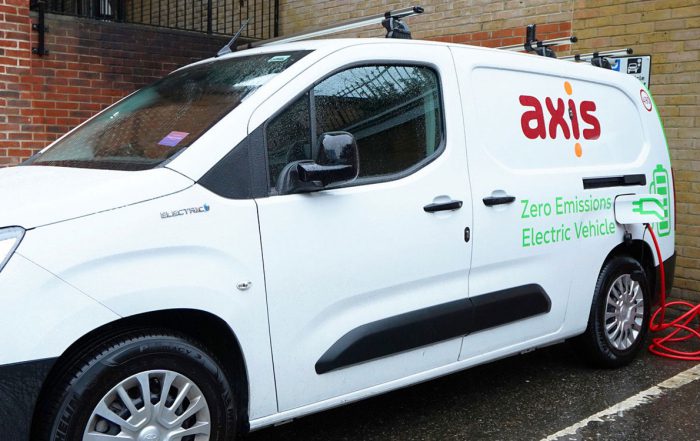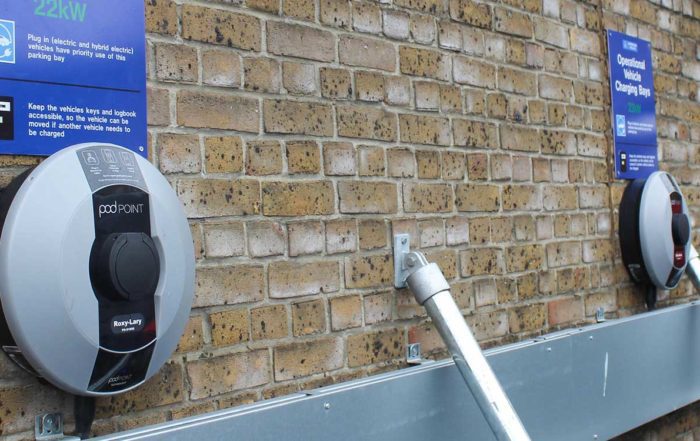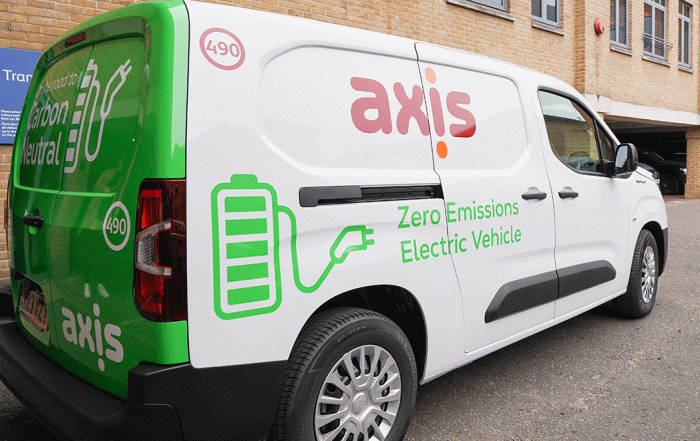Electric vehicle charging point installation service
Supporting clients to prepare for the UK’s transition to electric vehicles
Electric vehicle charging point installation service
Supporting clients to reduce their environmental footprint and prepare for the UK’s transition to electric vehicles.

Driving the change
Championing our clients’ efforts to lower carbon emissions, improve their sustainability profile and protect the environment for the future with the installation of EV charging points.

Access to OLEV grants
As an OLEV approved installer, Axis can support clients to access home and workplace government grant opportunities for electronic vehicle charging point installation.

Future-proof EV chargers
Providing charging points that are long-lasting and future-proof in design by carrying out a ‘whole life costing review’ and sourcing a bespoke list of sustainable and durable materials.

Continual support
On installation, we’ll provide clients with an explanation of usage as well as annual or cyclical inspections and servicing to ensure charging points are working to maximum efficiency.

A greener direction
With the introduction of 109 emission-compliant vans to our fleet, installation of our own EV charging points and a pilot of electric hybrid vehicles, Axis’ own initiatives continue to improve.
Have a project to discuss?
Want to speak to a member of our Social Housing team? Fill out our enquiry form and we’ll be in touch as soon as possible.
Electric Vehicle Charge Point Installers
EV charge point installations for homes and workplaces
Driving the change
Championing our clients’ efforts to lower carbon emissions, improve their sustainability profile and protect the environment for the future with the installation of EV charging points.
Access to OLEV grants
As an OLEV approved installer, Axis can support clients to access home and workplace government grant opportunities for electronic vehicle charging point installation.
Future-proof EV chargers
Providing charging points that are long-lasting and future-proof in design by carrying out a ‘whole life costing review’ and sourcing a bespoke list of sustainable and durable materials.
Continual support
On installation, we’ll provide clients with an explanation of usage as well as annual or cyclical inspections and servicing to ensure charging points are working to maximum efficiency.
A greener direction
With the introduction of 109 emission-compliant vans to our fleet, installation of our own EV charging points and a pilot of electric hybrid vehicles, Axis’ own initiatives continue to improve.
Case studies
We’re backing clients who want to provide residents, employees and the public with greener driving options. Read about our latest electric vehicle charging point installation projects.
Case studies
We’re backing clients who want to provide residents, employees and the public with greener driving options. Read about our latest electric vehicle charging point installation projects.
Project news
We value our environment and protecting our future, we’re continually reviewing and improving our sustainable performance. Find out about the latest and news and developments.
Electric Vehicles: Axis Charging Towards A New Fleet
Tim Aslett2024-01-23T08:17:20+00:00
As the world transitions to electric vehicles, our Fleet Team have been hard at work looking at eco alternatives for our vans.
Project news
Valuing the importance of protecting our environment and protecting our future, we’re continually reviewing and improving our sustainable performance. Find out about the latest and news and developments.
Electric Vehicles: Axis Charging Towards A New Fleet
Tim Aslett2024-01-23T08:17:20+00:00Tags: EV Charging News, Mechanical and Electrical, Sustainability|
As the world transitions to electric vehicles, our Fleet Team have been hard at work looking at eco alternatives for our vans.
Accreditations








Accreditations








FAQS
Axis can offer a wide range of bespoke solutions for commercial, public sector and social housing clients. There are various cutting-edge solutions on the market for different client bases that contribute to zero carbon performance. Technology includes the ability to scale alongside residents’ electric vehicle adoption rate, comprehensive billing software for multiple users to track costs, reliable easy-to-use charge points, intelligent power management/load balancing, and tailored design consultancy.
Our charging points installations are ideal for large office complexes where staff commute to the workplace via electric cars, businesses with a fleet of electric or hybrid cars and vans as well as homes. Based on each client’s budget, requirements and own sustainability goals, we will work with our specialist suppliers and designers to propose the best value solution to meet their needs.
Axis are working to support the UK’s effort to achieve zero carbon by 2035. EV charging points are key for this transition in order to support the increase in the number of electric vehicles on the roads.
There are many benefits to installing home and workplace EV charge points. Residents using home charging points can take advantage of off-peak tariffs, significantly reduced driving costs compared to petrol and diesel vehicles as well as take advantage of smart solutions for EV charging such as WiFi technology. Landlords and property owners can also increase the value of their properties by integrating an electric vehicle charging system.
For businesses, charities and local authorities installing charge points in the workplace, they can work towards operating a more environmentally friendly fleet of vehicles, save on maintenance and running costs, improve tax efficiencies and better their carbon performance and sustainability profile. They can also boost benefits offered to staff, offering free or subsidised electric car charging.
Axis takes care to consider how our client’s EV charging points can be future-proofed in order to reduce waste and save energy and costs in the long term. Having the ability to upgrade charging points is key, and we working closely with our clients to consider if and how their charging points can be upgraded, easily replaced and whether their systems are modular or multifunctional.
If clients decide to offer the maximum number of charging points on their available design, we’ll need to install a load management system. This works to ensure the cumulative load never exceeds the supply. Even where it is not necessary to install a charge point at every bay, we propose doing so at as many available bays as possible to enable future adaptations and upgraded without problems. The plan defines “active” (an actual socket connected to the supply system) and “passive” (a network of cables and power supply so that a socket can be added easily).
Axis take care to ensure that clients’ requirements, budgets, schedules and sustainability goals are met throughout the EV charge point installation process. We work closely with specialist suppliers and designers to create bespoke solutions that meet our clients’ needs. All installations start with an initial site survey, which is carried out by an Axis Surveyor. This involves checking that the existing supply, earthing equipment and infrastructure is adequate and compliant with relevant legislation.
We’ll need to know the specific type of Electric Vehicle Supply Equipment type so that we can check the area against the manufacturer’s guidelines. Any plan to install EV charging infrastructure needs to consider charge point hardware installation and necessary grid network reinforcement. Any R&D surveys are undertaken by HSE licenced, UKATA accredited suppliers. A full report will be provided to confirm our findings including details of the work required including photographic evidence and copies of survey reports and our recommended solutions.
Once all the relevant information has been received and processed, clients will receive a personalised work programme that has been collaboratively produced by the management contractor, our Liason Officer and our Surveyor. It is tailored to the clients’ requirements and timescale. It will indicate a realistic timeframe for the installation/s, based on the charging system chosen, existing infrastructure and additional work required, industry averages, prior experience, manufactures’ guidelines and sub-contractors recommendations. This programme is designed to provide clients with a transparent project pathway that clearly outlines sequencing, task owners, responsibilities and accountability. It will also include information about priority charging points, previously outlined and discussed.
Once we’ve completed any electrical upgrade work, charging point units can be placed and fixed. Then, we’ll make the connection to the electrical supply before carrying out stringent testing. Each installation will receive certification and sign off. Axis will provide an explanation of usage, O&M manuals as well as details of how and where the client can find further support. At each part of the process, we work with our appointed Liaison Officer and manage all stakeholders involved including clients, manufacturers, DNO, highways, TfL, local authorities, adjacent properties and businesses.
Our bespoke Quality Management Plan will include details of the standards, tests and certification required for each installation and will be used to develop bespoke inspection sheets for each stage.
Axis can provide a choice of power supplied to clients, based on their needs and requirements. It’s important to note that higher loads or large numbers of vehicle charging point may require infrastructural upgrades to meet the power demand.
Our Survey Team will coordinate the supply capacity being assessed by the DNO (Distribution Network Operator) as other EVSEs in the local area will play a factor in what can be supplied to the consumer. All clients receive a full report to confirm investigative findings which includes any recommended solutions if required.
We use the following guidance based on the desired charge point power:

Axis want to support clients to achieve greener driving options that work towards zero carbon regulations.
Our charge point installation teams have received OLEV-approved manufacturing training and take care to ensure that all work is carried out to comply with 18th Edition and that all EVSEs are signed off complete with the relevant documentation on commission. Axis has an ISO9001:2008 Quality Management System (QMS) in place which incorporates a stringent inspection regime to ensures each installation is monitored for compliance at each stage of the build.
Our installation teams are aware of the relevant regulations and compliance requirements that EV charge point installations must meet, including:
- BS-EN-61851-1:2019,
- Electromagnetic Compatibility Regulations 2016
- Electrical Equipment Safety Regulations 2016
- Design compliant with BS 8300:2009+A1:2010
- IET wiring regulations BS 7671:2018+A1:2020
- IET Code of Practice for Electric Vehicles Charging Equipment Installation
- BS EN 61851-1:2011
- Safety, Quality and Continuity Regulations 2002
Long-term efficiency is key and we work with a specialist team of suppliers to source sustainable, long-last materials.
To achieve a low/zero carbon installation, clients will also need to consider their energy supplier, opting for a supplier that is emission-free and powered via wind or solar panels. The effectiveness and carbon performance of installations will also depend on whether the client follows manufactures guidelines for annual or cyclical inspections.
In terms of future regulations, there is no UK wide regulatory or legislative requirement for EV charging provision although some Cities and Local Authorities have their own requirements. The leading local policy regarding the inclusion of charge points in new developments is the London Plan, with other regional and local planning documents often taking their lead from this.
Our dedicated management team and Quality and Sustainability manager regularly review and incorporate any new or upcoming changes to carbon regulations to ensure that are further proofing our installations as efficiently as possible.
All of Axis’ charging points installations are tailored to our client’s needs. The cost of installation will depend entirely on each clients’ set of requirements and a bespoke quote will need to be provided for each project. However, clients should expect that a single installation will differ largely in price to multiple installations in a public or private car park. As an OLEV approved installer, we can help clients to access grants that assist in the costs of EV charge point purchase and installation.
We’ll carry out an initial site survey. This will include an assessment of the existing incoming power supply, earthing and bonding arrangements, a compliance check and a review of installation requirements as per the manufacturer guidelines. Some installations may require additional infrastructure and this will be reflected in the cost of the installation.
Once charging points have been installed and are ready for use, clients’ should also factor in the cost of charging. This will depend on the type of vehicle and its battery size, charge point and local electricity rates, however, on average electricity rates costs 17p per kWh, which equates to as little as 4p per mile.
Time to charge depends entirely on a number of factors; the type of charge point, its power and speed as well as the size of the vehicle’s battery. Charging times can range anywhere between 30 minutes and 12 hours.
From empty to full power, a charge point with a power of 3.6kW will charge a vehicle in an average time of 11 hours, whilst a 7kW will take 5-7 hours on average to charge an EV vehicle.
Top up charging allows drivers to top up their vehicles whenever they park. This prevents an EV’s battery from running to empty by keeping the battery topped up which of course reduces the charging time.
An OLEV grant is a grant provided by the government, specifically the Office for Low Emissions Vehicles (OLEV), to assist in the installation of electric vehicle charging points. There are currently two schemes running: the Electric Vehicle Homecharge Scheme (EVHS) and the Workplace Charging Scheme (WCS).
Both grants are limited to 75% off purchase and installation costs up to a maximum of £350. The EVHS scheme enables the purchaser to claim one charge point per eligible vehicle, and up to two eligible vehicles per household. The WCS scheme offers businesses, charities and local authorities the opportunity to claim £350 per socket, up to a maximum of 40 sockets.
Amongst other specifications, in order to qualify for an OLEV grant for the home or workplace, the charge point must be installed by an approved OLEV installer. Axis has been approved by the Office for Low Emissions Vehicles as an approved installer and can use our experience to access the two OLEV grants available.
EV (electric vehicle) charging points are systems, also known as electric vehicle supply equipment (EVSE), designed to supply electric energy to plug-in electric vehicles. This can include electric cars, vans and buses.
They can be installed on properties such as homes, commercial premises, public sector dwellings as well as on the roadside and within fuel stations. EV charge points enable drivers to charge their vehicles whilst parked up, both during the day and at night. Drivers pay for the electricity they use via an app, RFID card, contactless payment, or in some workplaces or public locations, via ‘Plug and Play’.
There are three main types of EV charging: rapid, fast and slow. They are weatherproof units that must be installed by a qualified EV charging installer.
Other property sectors
Axis delivers its building maintenance, repairs and refurbishment services across a range of property sectors, click below to view case studies and news from our other divisions.
Social Housing
Social Housing
Public Sector
Public Sector
Heritage
Heritage
Other Property Sectors
Axis delivers its building maintenance, repairs and refurbishment services across a range of property sectors, click below to view case studies and news from our other divisions.








